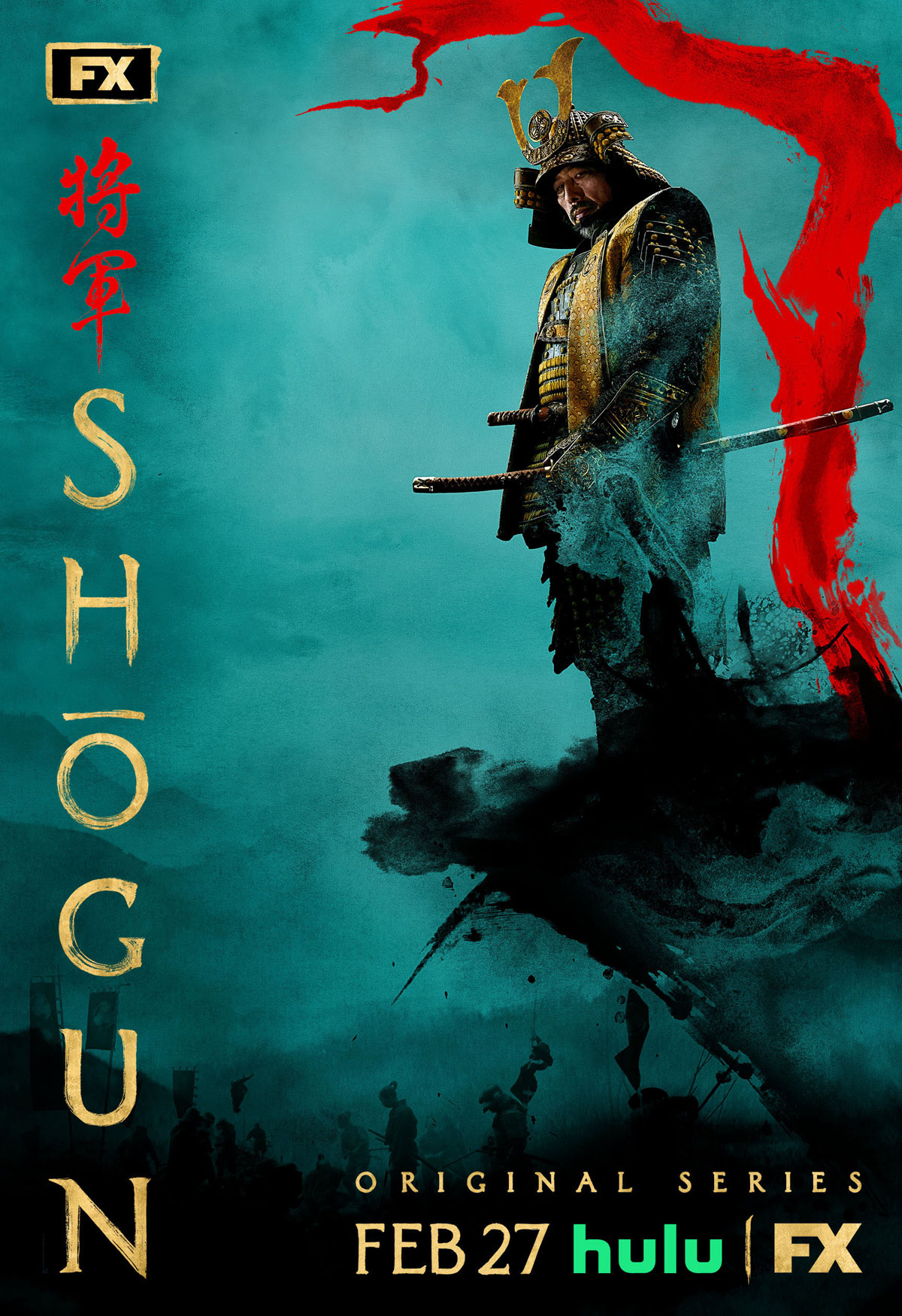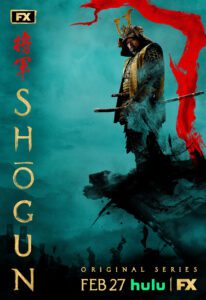As much as it pains me to say, I was alive and cognoscente enough as a human being to have seen and vaguely understood the original 1980 Shōgun miniseries. Okay, maybe I didn’t understand it, but I was probably permanently scarred as a very young person by the many, many beheadings. I was very much parented in the Gen X style of being parented. Meaning, my parents let me watch all sorts of stuff I shouldn’t have. Do all sorts of things I probably shouldn’t have. And pretty much did a lot of non-parenting. Or anti-parenting. You know, left in the park from 10 am to sundown to play in the crawl-around castle where the homeless junkie lived. Dragged to boozy adult parties as the only child (and the only child) that were like 80% cigarette smoke, chest hair and disco records. Point is, this 2024 version of Shōgun will most likely be a more enlightened, more modern take than the original. Even though the thing actually takes place in 1600.
Now that I’m a middle-aged man and not an adolescent, I can’t say my comprehension of what the hell is going on in Shōgun has improved all that much. My reading speed is probably better. And I’d like to hope I understand the adult relationships better. And am less disturbed by the constant suicides and head choppings. But my absolute garbage memory for names has me at a real disadvantage. The one white dude, John Blackthorne (Cosmo Jarvis), I have. His name is John. And, once again, he’s the only white dude who isn’t a Portuguese monk. And the only English speaker in the series. Even though he’s ostensibly speaking Portuguese 90% of the time he’s actually speaking English on screen. To make Jarvis speak his native English, Portuguese and Japanese was probably one step too far. And would have probably made an already pretty complex and confusing narrative just that much more complex and confusing. But then you add in all the Japanese names, Japanese titles that are sometimes subbed for their names and just the fact that you have to read everything on the screen and I often found myself reaching for the remote to pause and figure out who was talking about whom. And which city they were heading toward or from. I’m a poor TV watcher that way.
My slow comprehension aside, I very much enjoyed the series. Japanese culture — at least at this time in this place — is absolutely fascinating. Blackthorne is our avatar to some extent, but we often leave his perspective and can just marvel at the formality and bizarrely ritualistic manner of a country that at the time was isolated and steeped in a mystique that seems well earned if any of this is to be believed. Ritualistic suicide (seppuku) is not something that any Westerner could or can understand. Though it was the norm in Japan, apparently. Fail at some mission? Seppuku. Your wife leaves you? Seppuku. You fail scroll writing your junior year of high school? Seppuku. You overcook the noodles? Seppuku. It’s a way of life; and it happens over and over again in the show. You jam a large knife into your guts, disembowel yourself and then you have a “second” who stands by to behead you. And everyone is like, “Welp, on with our day, I guess.” And the person who chops off your head — usually a close co-worker, family member or best friend — washes up for dinner and sits down for a meal like nothing happened. No wonder Blackthorne spends most of the series with a bewildered look on his dumb face.
I’m not even going to attempt to explain what this is all about. But if you’ve seen Game of Thrones or any kind military type thing with warring tribes or vassals or whatever they’re called, you’ll get the idea. There’s palace intrigue, back-stabbing, front-stabbing, sabotage and political stuff. All of which is pushed through this Japanese lens that feels different and apart from all of the American and European history we learned in school. And, like Game of Thrones, it makes Japan feel about the size of Westeros. It’s hard to get a sense of scale, but both people and armies seem to get from one city to another in a matter of hours, when I imagine the travel is much greater than it comes across on screen. After all, most of the time people are on foot and carrying a litter with some old dude or woman inside it. It’s also almost always raining. So much rain. And I’m not sure if that was an intentional choice by the people shooting to show to kind of obscure backgrounds and give a kind of gauzy look to everything, but it makes Seattle look like Tempe. And maybe it does pour that much on the island nation, but it did make for a kind of cool surreal, almost painterly look and feel to the show’s exteriors. It wasn’t quite reality, but that worked for the show. And while there were practical sets, the slight smudge on everything outside may have been the effect of having an FX budget and not that sweet, sweet HBO money. Whatever the case, the series looked very cool and unique and certainly fit the content very well.
It’s tough to tell how good someone’s acting is when they’re not speaking a language you understand. Again, Cosmo Jarvis is English, spoke mostly English and certainly made some choices. His voice and his delivery are a meme at this point, but what at first was “What the hell is he doing?” kind of turned into, “I will miss his bizarreness when it’s gone.” It’s hard to tell if his character is truly a dummy, or if that’s just how he chose to play him. But there’s just something in the performance that is awesomely early career Keanu Reeves in its weirdness that makes you question if he’s just a charismatic, but pretty bad, actor. Or if this is all a choice and in its awkwardness is kind of brilliant. His wig, however, is terrible. One of the worst I’ve seen since Owen Wilson’s in Loki. It doesn’t help that his hair is shorn in the first episode into this choppy mess and somehow doesn’t change or grow for the entirety of the rest of the series. It’s real bad. The other English-speaking lead, Anna Sawai, is terrific. Her scenes with Jarvis are mostly in English, while she speaks Japanese to everyone else. But she leaps out on screen. Her will-she-or-won’t-she with Blackthorne is kind of the emotional heft of the thing if you’re into the romance side of it. Which is tempered to some degree by the fact all she wants to do is die, but is basically told she can’t by her overly-controlling and violent husband. Yeah, man, I told you this society is kind of different.
The rest of the cast, you can pretty much tell are doing a great job even if you can’t necessarily interpet their acting chops quite as easily. Tadanobu Asano plays a Little Finger type character we see in all of these types of shows, and also operates as our comic relief. He’s a schemer and a rat who is constantly being foiled by circumstance, dumb luck and his own ineptitude. Constantly huffing, cussing and basically rolling his eyes at his own misfortune, he brings moments of levity and personality in spots when it really feels necessary. A couple of the other women on the show really stuck out, including Fumi Nikaido and, in a smaller, but very critical, role, Moeka Hoshi. They had to be much more restrained than the men, who got to emote and battle and do all sorts of yelling and whatnot. They could only take little steps (literally) and often demure in the face of the men, but Nikaido showed strength in her character in cool ways, and Hoshi got to steal scenes with her surprising and staunch defense of Blackthorne, whom she is sworn by Japanese honor code to serve in any and all capacities.
Ultimately the series is intriguing mainly for its characters and how they all fit into the power struggles and personal battles with the overly formal construct of Japanese society. Blackthorne predictably asks once an episode to get his men back so he can sail back to England, when we all know that shiz isn’t happening. To watch him come to understand what feels like an entirely silly way to live life is fascinating. Just as we also learn about, question and ruminate on what it means to be “honorable.” All the while we try to figure out the motivations of our characters and what the hell Toranaga (Hiroyuki Sanada) is up to. Is he really a good dude who isn’t interested in being Shōgun and is willing to surrender to certain death in order to “save” his country? Or does he have a plan that he’s just not telling anyone about that he’ll spring on his enemies and swoop in and be the leader Japan needs in a moment of upheaval and uncertainty? Is he the most manipulative person ever? A master tactician? Or is everything he says and does on the up-and-up? We don’t know. A lot of his main people don’t know. Or do they? It’s all pretty messed up in the end, but is a highly satisfying conclusion and fits with what we’ve come to expect the series to be. And through it all is Blackthorne and his oddball posture and cadence. Such a weird, weird choice, I can hardly get over it. But it is affecting in a really memorable way. As is the whole of the series, really. Good job, everyone. Good job.



